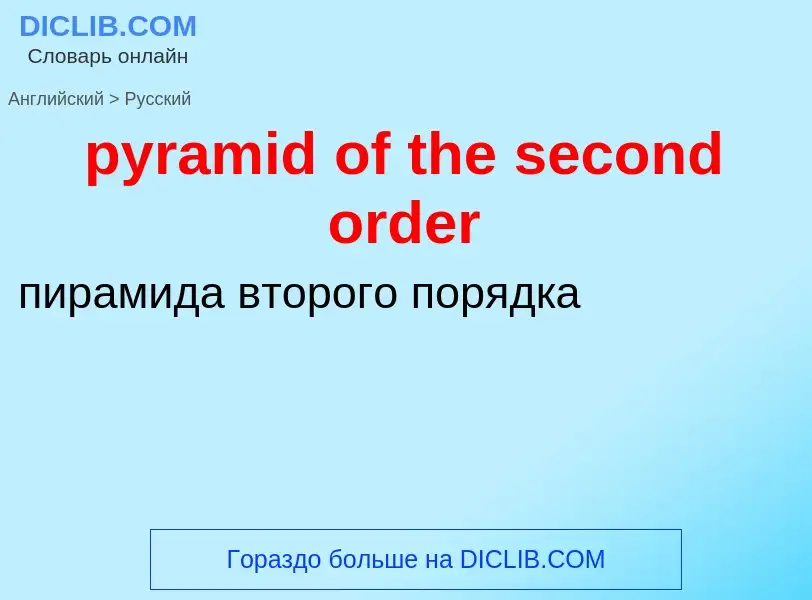Translation and analysis of words by ChatGPT artificial intelligence
On this page you can get a detailed analysis of a word or phrase, produced by the best artificial intelligence technology to date:
- how the word is used
- frequency of use
- it is used more often in oral or written speech
- word translation options
- usage examples (several phrases with translation)
- etymology
pyramid of the second order - translation to russian
[,ɔ:dərəvðə'bɑ:θ]
общая лексика
орден Бани (один из высших орденов; имеет три степени, в каждой два класса - военный и гражданский. Учреждён королём Георгом I [George I] в 1725; кавалер этого ордена получает личное дворянское звание "рыцарь" [knight])
в старину перед посвящением в рыцари будущий кавалер ордена совершал омовение
Definition
Wikipedia
In logic and mathematics, second-order logic is an extension of first-order logic, which itself is an extension of propositional logic. Second-order logic is in turn extended by higher-order logic and type theory.
First-order logic quantifies only variables that range over individuals (elements of the domain of discourse); second-order logic, in addition, also quantifies over relations. For example, the second-order sentence says that for every formula P, and every individual x, either Px is true or not(Px) is true (this is the law of excluded middle). Second-order logic also includes quantification over sets, functions, and other variables (see section below). Both first-order and second-order logic use the idea of a domain of discourse (often called simply the "domain" or the "universe"). The domain is a set over which individual elements may be quantified.

![[[Graffiti]] in [[Neukölln]] (Berlin) showing the simplest second-order sentence admitting nontrivial models, "∃φ φ". [[Graffiti]] in [[Neukölln]] (Berlin) showing the simplest second-order sentence admitting nontrivial models, "∃φ φ".](https://commons.wikimedia.org/wiki/Special:FilePath/Kindl-Treppe Aug2021d.jpg?width=200)

![Sir Alexander Milne]] (1808–1896) was concurrently KCB (civil division) and GCB (military division); he is pictured wearing both sets of insignia. Sir Alexander Milne]] (1808–1896) was concurrently KCB (civil division) and GCB (military division); he is pictured wearing both sets of insignia.](https://commons.wikimedia.org/wiki/Special:FilePath/Admiral Alexander Milne (1808-1896), by Walter William Ouless.jpg?width=200)
![Sir George Zambellas]] KCB (military division) Sir George Zambellas]] KCB (military division)](https://commons.wikimedia.org/wiki/Special:FilePath/First Sea Lord Admiral Sir George Zambellas KCB DSC ADC MOD 45155508.jpg?width=200)
 badge.jpg?width=200)

![Sir George Callaghan]] wearing the insignia of a military Companion of the Order Sir George Callaghan]] wearing the insignia of a military Companion of the Order](https://commons.wikimedia.org/wiki/Special:FilePath/George Callaghan - Project Gutenberg eText 18334.jpg?width=200)
![Banners of the senior Knights and Dames Grand Cross of the Order of the Bath in the [[Henry VII Lady Chapel]] in [[Westminster Abbey]] Banners of the senior Knights and Dames Grand Cross of the Order of the Bath in the [[Henry VII Lady Chapel]] in [[Westminster Abbey]]](https://commons.wikimedia.org/wiki/Special:FilePath/Henry7Chapel 01.jpg?width=200)



![mantles]] over imitations of 17th-century dress. They now wear them over contemporary attire. mantles]] over imitations of 17th-century dress. They now wear them over contemporary attire.](https://commons.wikimedia.org/wiki/Special:FilePath/Knight Grand Cross of the Order of the Bath.jpg?width=200)
![[[Mildmay Fane, 2nd Earl of Westmorland]], KB, with sash, c. 1630 [[Mildmay Fane, 2nd Earl of Westmorland]], KB, with sash, c. 1630](https://commons.wikimedia.org/wiki/Special:FilePath/Mildmay Fane in oils.jpg?width=200)
![Lord Rodney]] (appointed a Knight Companion in 1780) wearing the riband and star of the Order Lord Rodney]] (appointed a Knight Companion in 1780) wearing the riband and star of the Order](https://commons.wikimedia.org/wiki/Special:FilePath/Mosnier, George Rodney.jpg?width=200)

![Prime Minister]], who used the Order of the Bath as a source of political patronage Prime Minister]], who used the Order of the Bath as a source of political patronage](https://commons.wikimedia.org/wiki/Special:FilePath/Robertwalpole.jpg?width=200)
![Sir Richard Johns]] in his dress uniform, wearing the star, ribbon, and badge of a military Knight Grand Cross of the Order of the Bath Sir Richard Johns]] in his dress uniform, wearing the star, ribbon, and badge of a military Knight Grand Cross of the Order of the Bath](https://commons.wikimedia.org/wiki/Special:FilePath/Sir Richard Johns.jpg?width=200)
![[[Westminster Abbey]] with a procession of Knights of the Bath, by [[Canaletto]], 1749 [[Westminster Abbey]] with a procession of Knights of the Bath, by [[Canaletto]], 1749](https://commons.wikimedia.org/wiki/Special:FilePath/Westminster Abbey by Canaletto, 1749.jpg?width=200)
 in 1935.jpg?width=200)
 in 1935.jpg?width=200)
